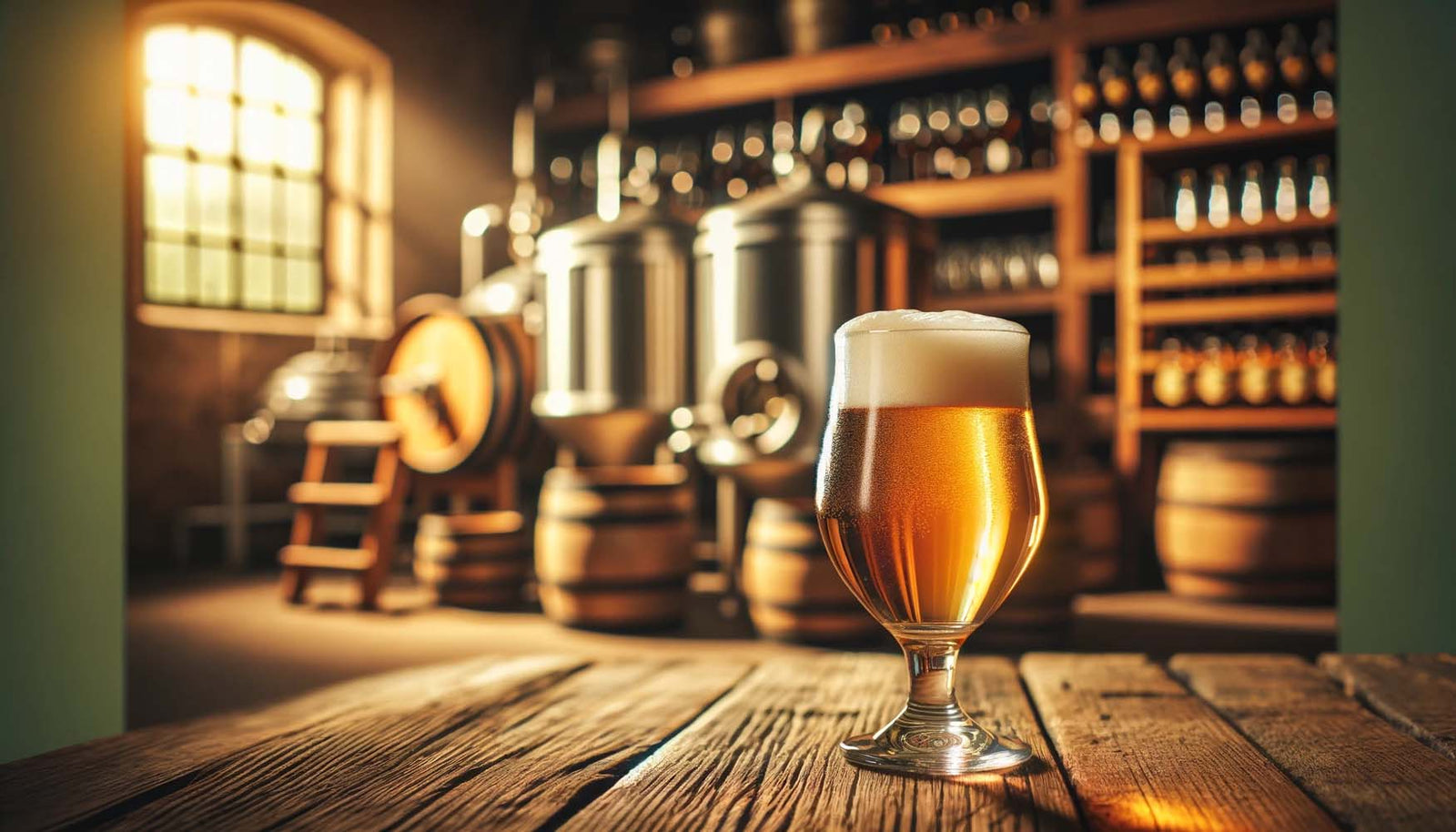Designed in Canada. built for serious brewers.

What is Kölsch Beer?
February 02, 2024 4 min read
What is Kölsch Beer?
Introduction
Kölsch beer, a celebrated brew hailing from Cologne, Germany, stands as a testament to the rich history and culture of brewing. This light, crisp ale, known for its unique taste and brewing technique, has won the hearts of beer enthusiasts worldwide. In this article, we dive deep into the world of Kölsch, exploring its origins, characteristics, and how you can brew this delightful beer in your own home.
The History of Kölsch
The story of Kölsch begins in the medieval streets of Cologne (Köln), a city with a brewing tradition dating back centuries. Initially overshadowed by the popularity of lagers and pilsners, Kölsch gradually carved out its niche in the beer world. Its rise to fame began in earnest in the 20th century, as local brewers sought to distinguish their product from the increasingly dominant lagers. Over the years, Kölsch became not just a beer but a symbol of Cologne's identity and pride.
What Makes Kölsch Unique
Kölsch is not just any beer; it's a symbol of tradition and precision. Unlike most ales, Kölsch is fermented with ale yeast but then conditioned at cooler temperatures, similar to lagering. This process, known as "cold fermentation," imparts a cleaner, crisper taste to the beer. The primary ingredients, including Pilsner malt and noble hops, contribute to its distinct, subtle fruitiness and balanced bitterness.
Taste Profile of Kölsch
Kölsch offers a unique taste experience. It's often described as a hybrid between an ale and a lager, combining the best of both worlds. The flavor profile of Kölsch is characterized by a slight fruitiness, a hint of apple or pear, and a gentle hop bitterness. The beer's light body, combined with its refreshing nature, makes it a popular choice, especially during warmer months.
Kölsch in the Brewing Community
Kölsch is more than just a beer style; it's a community builder. Its rise in popularity is not confined to its birthplace in Cologne; it has gained a global following, particularly among craft beer enthusiasts. Brewers worldwide are drawn to its unique brewing process and distinct flavor profile, leading to a variety of interpretations. However, the essence of Kölsch—its lightness, clarity, and subtle complexity—remains a constant.
Brewing Your Own Kölsch: A 5-Gallon All-Grain Recipe
Ingredients:
- 9 lbs Pilsner malt
- 0.5 lbs Vienna malt
- 0.25 lbs Wheat malt
- 1.5 oz Hallertauer Mittelfrüh hops (for boiling)
- 0.5 oz Hallertauer Mittelfrüh hops (for finishing)
- Kölsch yeast (e.g., Wyeast 2565 or White Labs WLP029)
- Priming sugar (if bottling)
Brewing Process:
- Mashing: Heat 3.5 gallons of water to 150°F. Add grains and maintain the temperature for 60 minutes.
- Lautering: Sparge with 5 gallons of water at 170°F.
- Boiling: Bring the wort to a boil, add 1.5 oz of hops, and boil for 60 minutes. Add the remaining hops in the last 5 minutes of boiling.
- Cooling and Fermenting: Cool the wort to 70°F, transfer to the fermenter, pitch the yeast, and ferment at 65°F for about 2 weeks.
- Bottling/Kegging: After fermentation, bottle or keg the beer with priming sugar. Carbonate and age for at least two weeks.
Tips for Perfecting Your Kölsch Brew
- Temperature Control: Maintain the right fermentation temperature, around 60-65°F.
- Yeast Selection: Choose the right Kölsch yeast strain and allow enough time for fermentation.
- Hop Balance: Use noble hops like Hallertauer for a balanced bitterness and aroma.
- Patience in Conditioning: Lager the brew for a few weeks after fermentation for clarity and crispness.
Conclusion
Kölsch beer is more than just a refreshing drink; it's a journey into the heart of German brewing tradition. With its unique brewing process and delightful flavor profile, Kölsch is a style that both challenges and rewards the brewer. Whether you're a seasoned brewer or just starting, brewing a Kölsch offers an opportunity to refine your craft and enjoy a beer that is both light in body and rich in history. So, gather your brewing equipment, follow our 5-gallon all-grain recipe, and embark on your Kölsch brewing adventure!
Now that you've delved into the the art of making Kölsch, you're well-equipped to take your brewing adventures to the next level. Whether you're a seasoned brewmaster or a homebrew hobbyist, Bräu Supply has the perfect brewing system to suit your needs. Our innovative Unibräu line, including the all-in-one Unibräu and the advanced Unibräu Pro, simplifies the brewing process without compromising on quality. For those who prefer a traditional approach, our efficient electric HERMS system awaits. And let's not forget our Unitank jacketed fermenters, designed for the ultimate brewing experience. With our modular, high-quality 304 stainless steel products and a plethora of accessories, Bräu Supply ensures you have everything you need to create exceptional beers, whether you favor aerobic or anaerobic fermentation. Ready to elevate your brewing? Check out our products and discover how Bräu Supply can enhance your brewing journey.
MORE ARTICLES HOW TO BREW BEER
The ultimate guide to Kveik yeast: Unleashing it's fermentation potential
Revolutionizing home brewing: The simplified art of no sparge brewing
Exploring amber ales: A guide with a twist on the traditional recipe
Mastering cold crashing: Enhancing beer clarity and accelerating the aging process
What is the basic function of the fermenter?
What causes a fermenter to heat up?
The art of lagering: A guide to perfecting the cold conditioning process
Troubleshooting fermentation problems in brewing: A comprehensive guide
Subscribe
Sign up to get the latest on sales, new releases and more …

